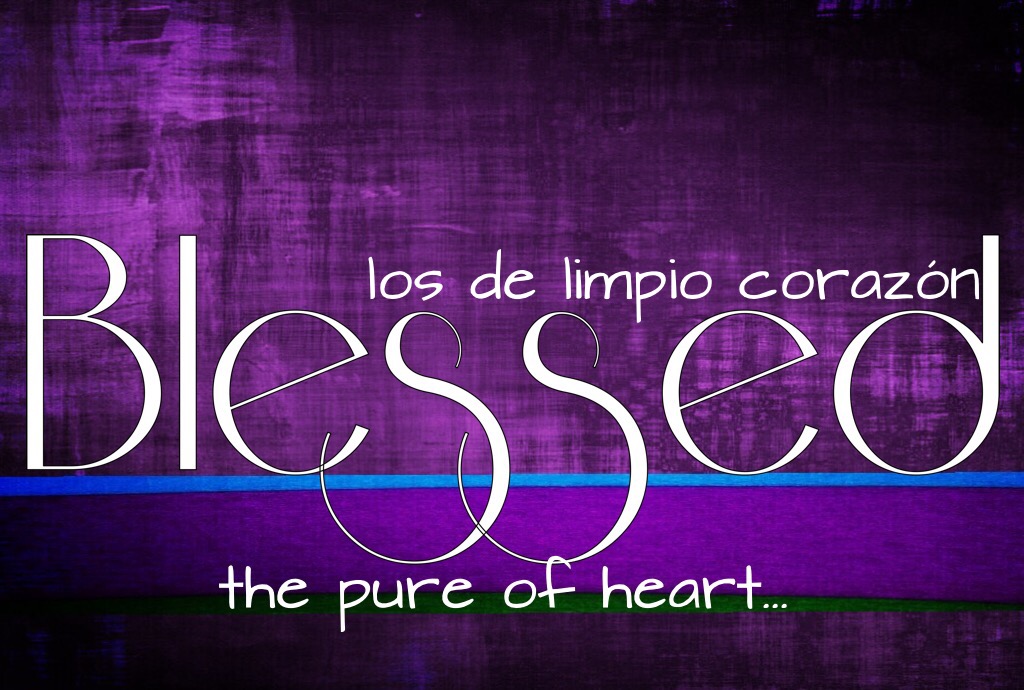Finding the way to The Way: Blessed Are the Clean of Heart
share
For Lent this year, we have asked eight sisters and associates to reflect on the Beatitudes and offer ways in which we may embrace these blessings in our own Lenten journeys. There will be additional reflections published for Ash Wednesday, Palm Sunday, Holy Thursday and Easter.
By Avis Clendenen, Mercy Associate
One of the best-known preachers in our world today, the Rev. Dr. Barbara Brown Taylor, offers an elegant paraphrase of the Sermon on the Mount. She renders the sixth Beatitude, “Blessed are the clean of heart, for they will see God” as “Blessed are the whole-hearted, for they shall see God.” (Always a Guest: Speaking of Faith Far from Home)

Actually, a more original strict rendering of the text would read: “Blessed are those without a double soul, for they shall see God.” To be clean of heart in the ancient world was to be someone who successfully resolved the forces of opposition within themselves. In the ancient world, the relation of heart to soul was what we today would consider brain to nerves. The heart (brain) told the soul (nerve center) what to do. The message—carried physiologically— resulted in human actions that were consistent with the message. To strive to be a person clean of heart was to be a person moving in one direction, not duplicitous. One’s whole being—whole heart— was congruent, integrated, acting with integrity. Others can count on such a person to consistently be who she says she is (I Tim. 6:14) and not for her sake alone, but for that larger lure of the One in whom we live and move and have our being (Acts 17:28).
Rev. Brown Taylor suggests that the Beatitudes are as close as we get in Christian life to membership requirements. And they are hefty requirements, although we fall prey to being numbed in the hearing since we know them so well. Or so we think. As a literary form, the Beatitudes are short, two-part affirmations that sum up a good life. For Christians, they serve as signposts for following the way to the Way. (“The Way” was the term first used by followers of Jesus). Understandably, we wish for the second half of the sentence to arrive without the claims of the first. In the instance of the sixth Beatitude, we want to see God and forestall engagement with the claims of dealing with our own double soul or failures in whole-heartedness. At the same time, we know, as they would have known in Jesus’ time, that the only way to inherit the second part of the Beatitude is to embrace the first. As mentioned, the ancient ear in the hearing of the sermon would know that Jesus is not demanding something but simply telling his hearers the way that will take them to the Way.
So what’s in the way? Even millennia ago, the ancients knew that the human condition struggles with the inauthentic self or, as the apostle Paul would say, being caught in the snares of the false spirit. The markers of the manifestation of the false self that arise when following the false spirit are summed up in Paul’s Letter to the Galatians: “When self-indulgence is at work the results are obvious: sexual vice, worship of false gods, antagonisms and rivalry, jealousy, bad temper, quarrels, factions and malice, drunkenness, outbursts of fury, acts of selfishness, party intrigues, and fits of rage” (Galatians 5:19–21). Ceding to these lures creates the double-souled dynamic— that which interferes with a whole-hearted self that the Beatitude encourages as the way to see God.
One cannot live an authentically whole-hearted life when inflating and maintaining one’s ego is the primary daily task, which can be as subtle as the way we disguise our personal ambition or self-promotion with a persona of service. To be authentically clean of heart—truly whole-hearted—requires the hard work of growth in self-knowledge, willingness to engage in real discernment of spirits, quelling the forces of duplicity within our personality to arrive at congruency and living with healthy doses of humility.
The poet Mary Oliver illumines the inner life of “Blessed are the whole-hearted, for they shall see God” in her poem “To Begin With, the Sweet Grass” (from Evidence, 2009):
What I loved in the beginning, I think, was mostly myself.
Never mind that I had to, since somebody had to.
That was many years ago.
Since then I have gone out from my confinements, though with difficulty.
I mean the ones that are thought to rule my heart.
I cast them out; I put them on the mush pile.
They will be nourishment somehow
(everything is nourishment somehow or another).
And I have become the child of the clouds, and of hope.
I have become the friend of the enemy, whoever that is.
I have become older and, cherishing what I have learned, I have become younger.
And what do I risk to tell you this, which is all I know?
Love yourself. Then forget it. Then, love the world.
Blessed are those who, during the journey of these 40 days, truly become more whole-hearted, for through them the rest of us can see God.